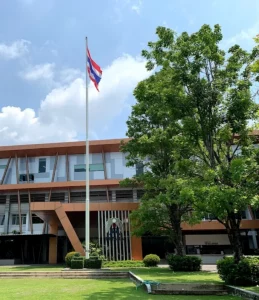
What is it like to work in Biochemical Engineering?
Nuttinee Yongsanguanchaispent eight of her formative years, from Year 1 to Year 9, at Bangkok Patana School. In 2007, she transferred to the UK to complete her GCSEs and A-levels and pursue further education.
Nationality: Thai
Years at BPS: Year 1-9 (1998-2007)
University: BSc Nutrition and Food Science, University of Reading 2014, MSc Biochemical Engineering University College London 2015, PhD Chemical Engineering, University College London

Nuttinee Yongsanguanchaispent eight of her formative years, from Year 1 to Year 9, at Bangkok Patana School. In 2007, she transferred to the UK to complete her GCSEs and A-levels and pursue further education. She completed her BSc at the University of Reading in Nutrition and Food Science and then proceeded to University College London for a Master’s degree in Biochemical Engineering. Nuttinee has become particularly interested in stem cell research and is currently in her final year as a PhD researcher at UCL in Regenerative Medicine.
“PhD research is all about discovering novel things and being the first to publish your data in journals. Labs are competitive and secretive because they don’t want other groups to steal their idea and publish work before them so usually you only show your results at conferences when you’re really close to publishing. However, people also collaborate a lot, because in exchange for their help their name will be in the publish work. It really all about getting your name in as many papers as possible,” explained Nuttinee. She gets her motivation to work from her belief that regenerative medicine is the future. “I work mainly with stem cells called Induced Pluripotent Stem Cells (iPSCs). These are adult cells that have been reprogrammed back to a stem cell state. You can use your skin cells or hair cells to make stem cells – it’s just so crazy! I truly believe that in the future you can grow your own organs from this!” she said. Groundbreaking reseach isn’t always exciting. Nutinee said she has to endure many failed experiments, and sometimes it is hard to figure out what went wrong because everything was done the same way as a previous experiment that failed.
Nutinee’s specific goal is to improve the way stem cells are grown. A lofty goal that wold really be ground breaking in her field. “As mentioned, I work with iPSCs. They are equivalent to the Embryonic stem cells and can become any cell within the human body. Conventionally these cells are grown in incubators at 21% oxygen (atmospheric level) and on plastic. My research is to grow them on conditions that are more similar to what would be found in the body and grow them on plastic that is as soft as brain or as hard as bone or muscles. Currently to differentiate stem cells into a particular cell type lots of expensive reagents are added so we hope that by growing them in these conditions it would help direct them to that cell type without having to add the expensive reagents and therefore reduce the cost.”
Did Bangkok Patana have any influence on her determination to pursue this path? “I think the most important thing I learnt during my nine years at Bangkok Patana was to be comfortable and confident with myself. Patana created an environment where my young self could learn to be confident and grow. This really helped me to be comfortable in any situation instead of being like others I have seen who struggle with meeting new people or being in new environments or with public speaking.”
Nuttinee hopes to spend a few years in the stem cell industry and clinical trials and then move onto to life sciences and biotech consulting. All the best with your research, Nutinee!!






